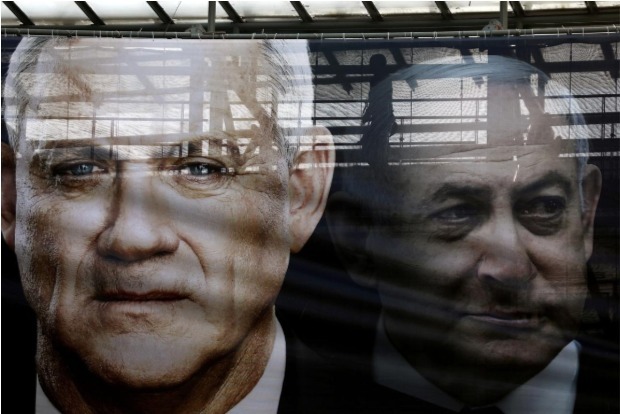Begin typing your search...
Netanyahu and rival Gantz clinch Israel power-sharing deal
Netanyahu, who is under criminal indictment in three corruption cases, will remain prime minister for 18 months after which Gantz will replace him, according to the agreement signed by both men.

Israeli Prime Minister Benjamin Netanyahu and his centrist election rival Benny Gantz signed a deal on Monday to form a national emergency government, ending a year of unprecedented political deadlock.
The power sharing agreement clinched after weeks of negotiations gave a clear end-date for the premiership of Netanyahu, Israel’s longest serving leader, who has become for many the face of the nation.
Netanyahu, who is under criminal indictment in three corruption cases, will remain prime minister for 18 months after which Gantz will replace him, according to the agreement signed by both men.
Netanyahu’s trial on charges that include bribery, fraud and breach of trust is due to begin on May 24. He denies any wrongdoing.
Over the past year the right-wing leader, in power for more than a decade, has presided over a caretaker government following three inconclusive elections in April and September 2019 and on March 2, just as the country began grappling with the coronavirus outbreak.
“We have prevented a fourth election. We will protect democracy. We will fight coronavirus and care for all Israel’s citizens,” Gantz said on Twitter after signing the deal. Netanyahu Tweeted the Israeli flag.
Until he takes over as premier, Gantz, a former armed forces chief, will serve as defence minister with his political allies receiving the same number of ministerial portfolios as Likud.
The coalition agreement, released to the media, also states that while the new government will strive for peace and regional stability, plans to extend Israeli sovereignty to Jewish settlements in the occupied West Bank - land that the Palestinians seek for a state - could be promoted.
The move would mean a de-facto annexation of territory presently under Israeli military control. It would have to be greenlighted by the United States, after which Netanyahu would be permitted to advance plans from July 1, the agreement says.
“Given the Trump administration’s close relationship with Netanyahu, we have very serious, challenging days ahead,” said Hanan Ashrawi, a senior Palestine Liberation Organisation official. “This is extremely dangerous not just for Palestine, for Israel, for the region, but for the world.” A U.S. peace proposal announced by President Donald Trump in January was embraced by Israel and rejected flat out by the Palestinians, partly because it awards Israel most of what it has sought during decades of conflict, including nearly all the occupied land on which it has built settlements.
But the new Israeli government’s first priority would be managing the coronavirus crisis.
Israel, with a population of about 9 million, has so far confirmed more than 13,500 COVID-19 cases and 173 deaths. Restrictions to curb coronavirus transmission have sent unemployment above 26%.
On the campaign trail, Gantz pledged not to serve in a government led by a prime minister facing criminal charges, but he backtracked last month, saying the enormity of the coronavirus crisis necessitated an emergency unity government.
The decision to join forces with Netanyahu enraged many of Gantz’s political allies who split from the party and will be part of the opposition in Israel’s 120-member parliament.
Visit news.dtnext.in to explore our interactive epaper!
Download the DT Next app for more exciting features!
Click here for iOS
Click here for Android
Next Story



